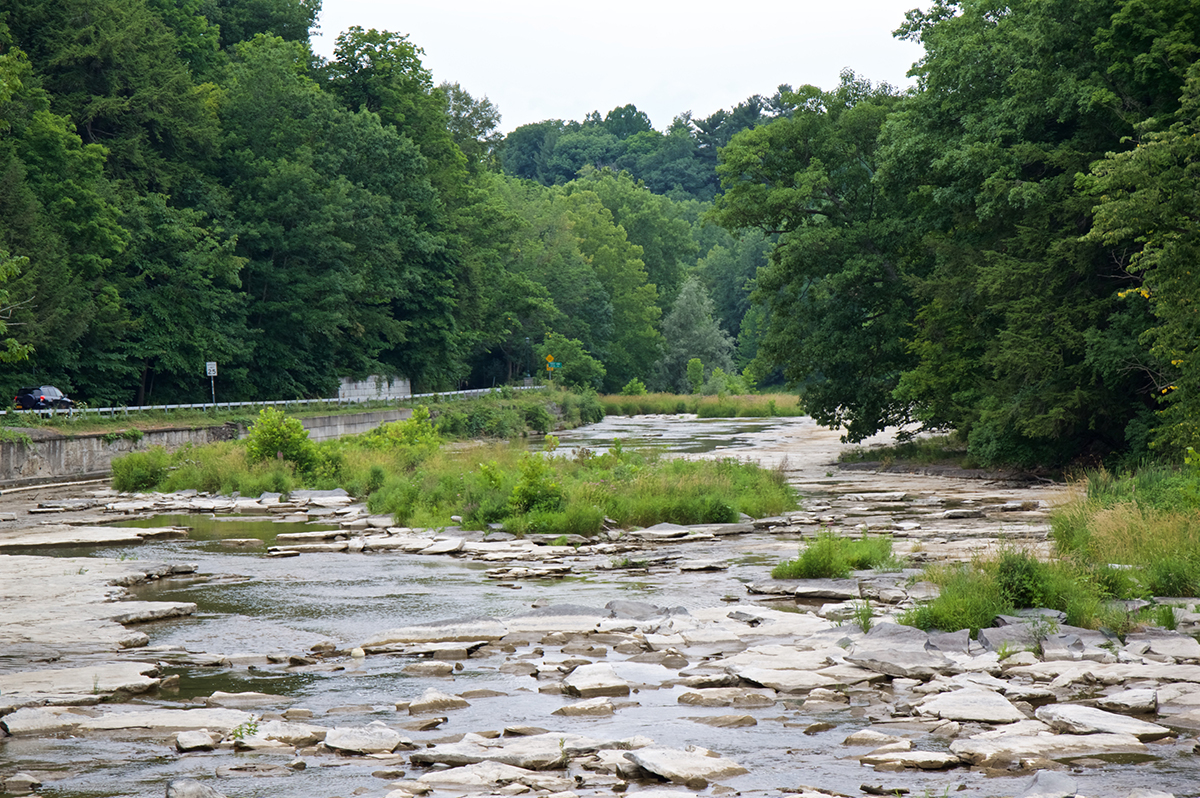Cornell issues water use restrictions as drought worsens
By Blaine Friedlander

Now in the most severe drought seen in Tompkins County since climate data records have been kept, Cornell has reached second-stage drought level and issued water use restrictions effective July 28.
The restrictions require Ithaca campus faculty, staff and students to cease using potable – clean, treated – water on campus to water lawns, landscapes and vegetation; to power wash or clean driveways, sidewalks, building surfaces and asphalt; to wash vehicles unless required for safety or compliance; or to use for recreation, such as for sprinklers, games or camp activities.
In addition to the Ithaca campus community, residents of Cornell Heights and the hamlet of Forest Home who also receive water from the Cornell water distribution system are being asked to adhere to the water use restriction.
“If the drought continues and we don’t reduce our overall water consumption, we may have insufficient potable water to supply the demands of campus this August,” said KyuJung Whang, vice president for Infrastructure Properties and Planning. “For the university to maintain its mission-critical operations, we must work together as a community to decrease overall water use on campus by at least 30 percent as soon as possible.”
The only exception to the restriction is for two athletic fields, where sod has recently been installed.
“The work on McGovern soccer field started in early June, and the resodding work at Berman soccer field began in early July. With new sod, we need to water the grass throughout the day or it will die,” said Whang. As a result, both of those fields continue to be watered. Effective Monday, Aug. 1, athletics will use nonpotable water from Cayuga Lake to water those fields.
The central New York area is in a D2 level drought, according to the U.S. Department of Agriculture. Since March 1, Ithaca has received only 8.64 inches of rain, making this the most severe lack of precipitation in the area’s history, surpassing March 1-July 27, 1962, as the driest period on record by 12 one-hundredths of an inch, according to Cornell’s Northeast Regional Climate Center (NRCC).
Typically, campus buildings, laboratories and farms on campus use between 1.3 million and 1.5 million gallons of water daily, obtained from Fall Creek – the tributary that feeds Cornell’s campus, according to Chris Bordlemay, water and wastewater manager.
The Fall Creek water flow rate as of July 28 measured 9.5 cubic feet per second; normal flow rate in the summer ranges between 40 and 50 cubic feet per square second. If the water flow rate drops to below 6 cubic feet per second, the university will need to purchase water from outside sources.
Cornell is already exploring the option of purchasing water from Bolton Point Water System, a municipal system that draws water from Cayuga Lake and supplies the city of Ithaca. Cornell also has begun looking for trucking vendors to pump and transport water from the Lake Source Cooling Wet Well on Cayuga Lake to campus. This nonpotable water would be used to water athletic fields, landscapes and other areas that do not require treated water. Officials say this would not have a negative impact on the lake.
The university’s Drought Emergency Planning Team is engaging key campus leaders to identify additional strategies to reduce water consumption across campus, as well as meeting with city of Ithaca and Bolton Point Water System officials to coordinate conservation efforts.
“The anticipated duration of these restrictions is a minimum of four to six weeks,” said Whang, who said restrictions are effective until further notice. There is a potential for extending or escalating to a higher level of drought response if restrictions do not meet needs or drought conditions remain.
Temperatures for the area are forecast to be above normal in August, and precipitation will continue below normal, according to NRCC senior climatologist Keith Eggleston. The 90-day forecast calls for warm temperatures through October, and no data is available yet to be able to predict precipitation.
Water use data will be collected daily and be made available to the campus community starting Aug. 2. Members of the Cornell community can also submit ideas to curb water use. Visit campusdrought.ipp.cornell.edu for more information.
How you can help:
The university asks all campus community members to assist in implementing the following conservation measures immediately in all campus facilities:
• Report any water leaks, running toilets, dripping faucets or other water issues to your building coordinator immediately;
• All facility managers are asked to check fixtures, toilets and piping for leaks; to submit repair requests immediately; and to continue regular assessment of water fixtures;
• Limit personal shower use to three to five minutes, using colder water when possible;
• Turn off faucets while brushing teeth, washing hands or cleaning dishes; discontinue drawing water from area creeks or other accessible water sources; and implement systems to reuse water wherever possible.
Media Contact
Get Cornell news delivered right to your inbox.
Subscribe